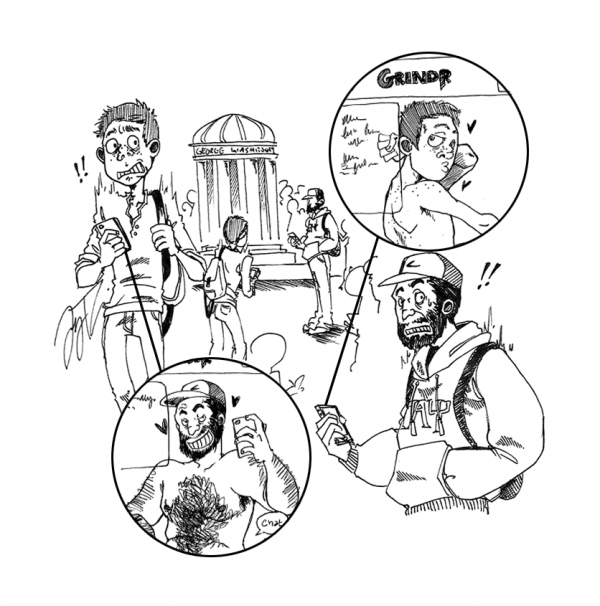It has happened to all of us. You’re walking through Kogan Plaza when suddenly you lock eyes with someone you vaguely recognize but can’t put a name to. Confused by the encounter, you keep walking until it hits you: You know them from Tinder or Grindr.
The explosion of dating and hook-up apps on college campuses often creates some awkward encounters.From the unsolicited pictures I’d rather not describe, to the array of men old enough to be your father, Grindr provides almost as much fodder for jokes as it does actual dates.
It also has spawned a collection of Grindr bios that would make any self-respecting sociology or women’s studies major cringe. The phrases “no fems,” “str8-acting” and “no black guys” add a shocking amount of racism and sexism to what could otherwise be a welcoming platform.
These phenomena are concerning, but we shouldn’t downplay the positive influence these apps have had on college culture. Jokes and awkwardness aside, the proliferation of apps like Tinder and Grindr has liberalized our sexual and romantic lives, and helped open up needed conversations about sex.
And like all great things, this trend has queer people to thank. Grindr was one of the first casual hook-up apps, designed exclusively for gay men.
Though commonly despised for its glitchy software and multitude of creepy-looking people cruising for some late-night fun, Grindr has its benefits: While straight girls at GW often joke about how all the men here are gay, the fact is that we are still the minority.
Being gay, even at a progressive school like GW, comes with the challenges of openness, safety and ease in finding relationships or sex.
Even in the “gayest city in America,” the number of queer people is comparatively small. We are stereotyped and often marginalized, and our sex lives are often relegated to a small handful of “gay” establishments. Grindr speeds up this process for gay men, and has made finding a quick hook-up, conversation or maybe a date only a quick seductive message away.
But there’s more where that comes from.
Tinder has emerged as an option for students of all sexual orientations. While the online dating world for straight people used to be limited to recently divorced suburban soccer moms on Match.com and socially awkward young professionals on OkCupid, Tinder finally gave straight college students a service with the speed and simplicity they demand.
Regardless of which app we use, the truth is that more students on this campus than we’d like to admit use these phone apps.
Screening potential matches before we meet them in person allows us to be more open and honest with ourselves and others about what – and who – we are looking for. It even takes away from the limitations of “real-world” flirting, often limited to Friday night drunken debauchery.
Tinder and Grindr acknowledge our changing needs and wants regarding sex and romance, and allow us to seek sex when we want it. Sexuality is not limited to drunken nights at frat houses or at clubs, and these apps let us hook up on our own time, even when we’re sober.
And you’ll notice that the more people start using these apps, the more they will be open to talking about them. It is healthy to be straightforward when it comes to sexuality, including sexual needs and desires. These apps take away the stigma of talking about these issues before hooking up with someone and, at the very least, let us laugh about weird messages we receive or talk about the hot people down the street.
Still, while I’m all for communication, here’s a bit of advice: Try to at least start with a hello before we move right to nudes.
The writer, a sophomore majoring in political science and sociology, is a Hatchet opinions writer.





